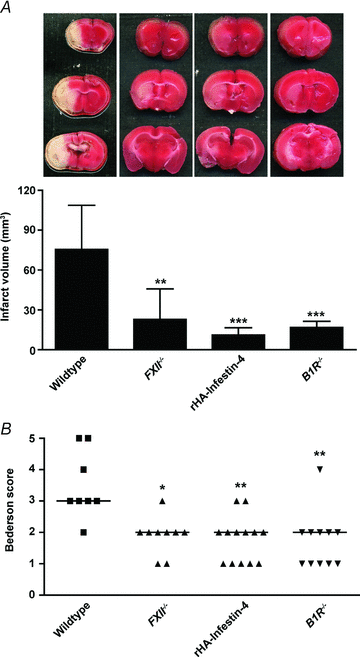Ischaemic stroke: a thrombo-inflammatory disease?
- PMID: 21768262
- PMCID: PMC3180572
- DOI: 10.1113/jphysiol.2011.212886
Ischaemic stroke: a thrombo-inflammatory disease?
Abstract
Ischaemic stroke is a leading cause of death and disability worldwide. The complex cellular interactions leading from thromboembolic vessel occlusion to infarct development within the brain parenchyma in acute stroke are poorly understood, which translates into only one approved effective treatment, thrombolysis. Importantly, however, patients can develop progressive stroke despite reperfusion of previously occluded major intracranial arteries, a process referred to as 'reperfusion injury' which can be reproduced in the mouse model of transient middle cerebral artery occlusion (tMCAO). Although pathological platelet and coagulant activity have long been recognized to be involved in the initiation of ischaemic stroke, their contribution to infarct maturation remained elusive. Experimental evidence now suggests that early platelet adhesion/activation mechanisms involving the von Willebrand factor (vWF) receptor glycoprotein (GP) Ib, its ligand vWF, and the collagen receptor GPVI are critical pathogenic factors in infarct development following tMCAO, whereas platelet aggregation through GPIIb/IIIa is not. Further experimental work indicates that these pathways in conjunction with coagulation factor XII (FXII)-driven processes orchestrate a 'thrombo-inflammatory' cascade in acute stroke that results in infarct growth. This review summarizes these recent developments and briefly discusses their potential clinical impact.
Figures



References
-
- Adams HP, Jr, del Zoppo G, Alberts MJ, Bhatt DL, Brass L, Furlan A, Grubb RL, Higashida RT, Jauch EC, Kidwell C, Lyden PD, Morgenstern LB, Qureshi AI, Rosenwasser RH, Scott PA, Wijdicks EF. Guidelines for the early management of adults with ischemic stroke: a guideline from the American Heart Association/American Stroke Association Stroke Council, Clinical Cardiology Council, Cardiovascular Radiology and Intervention Council, and the Atherosclerotic Peripheral Vascular Disease and Quality of Care Outcomes in Research Interdisciplinary Working Groups: the American Academy of Neurology affirms the value of this guideline as an educational tool for neurologists. Stroke. 2007;38:1655–1711. - PubMed
-
- Adams HP, Jr, Effron MB, Torner J, Davalos A, Frayne J, Teal P, Leclerc J, Oemar B, Padgett L, Barnathan ES, Hacke W. Emergency administration of abciximab for treatment of patients with acute ischemic stroke: Results of an international phase III trial. Abciximab in Emergency Treatment of Stroke Trial (AbESTT-II) Stroke. 2008;39:87–99. - PubMed
-
- Al-Tamimi M, Gardiner EE, Thom JY, Shen Y, Cooper MN, Hankey GJ, Berndt MC, Baker RI, Andrews RK. Soluble glycoprotein VI is raised in the plasma of patients with acute ischemic stroke. Stroke. 2011;42:498–500. - PubMed
-
- Austinat M, Braeuninger S, Pesquero JB, Brede M, Bader M, Stoll G, Renne T, Kleinschnitz C. Blockade of bradykinin receptor B1 but not bradykinin receptor B2 provides protection from cerebral infarction and brain edema. Stroke. 2009;40:285–293. - PubMed
Publication types
MeSH terms
Substances
LinkOut - more resources
Full Text Sources
Other Literature Sources
Medical
Miscellaneous

